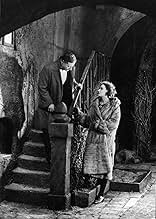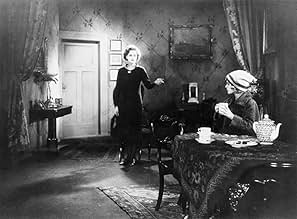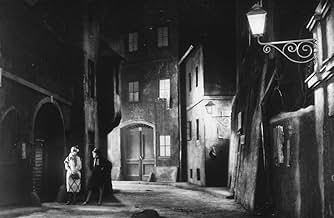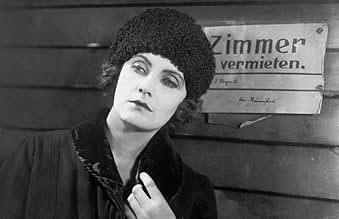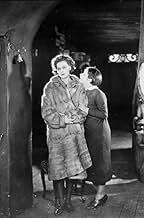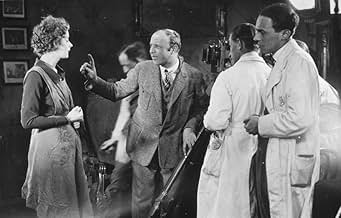NOTE IMDb
7,0/10
1,8 k
MA NOTE
Dans un bidonville à Vienne au lendemain de la première guerre mondiale, Lila Leid, l'épouse d'un avocat, est assassinée. La secrétaire d'un de ses clients est arrêtée. Il était avec elle et... Tout lireDans un bidonville à Vienne au lendemain de la première guerre mondiale, Lila Leid, l'épouse d'un avocat, est assassinée. La secrétaire d'un de ses clients est arrêtée. Il était avec elle et avait son collier, car il avait besoin d'argent.Dans un bidonville à Vienne au lendemain de la première guerre mondiale, Lila Leid, l'épouse d'un avocat, est assassinée. La secrétaire d'un de ses clients est arrêtée. Il était avec elle et avait son collier, car il avait besoin d'argent.
- Réalisation
- Scénario
- Casting principal
Ágnes Eszterházy
- Regina Rosenow
- (as Agnes Esterhazy)
Renate Brausewetter
- Frau
- (non crédité)
Mario Cusmich
- Oberst Irving
- (non crédité)
Maria Forescu
- Frau
- (non crédité)
Robert Garrison
- Don Alfonso Canez
- (non crédité)
Valeska Gert
- Frau Greifer
- (non crédité)
Tamara Geva
- Lia Leid
- (non crédité)
Max Kohlhase
- Marias Vater
- (non crédité)
Avis à la une
1st watched 2/6/2007,61 minute edited version - 6 out of 10 (Dir-G.W. Pabst): Interesting silent drama that shows the major differences between upper-echelon and depression Austria after World War I and portrays it very well for the most part. The movie turns into a romantic piece in the last quarter which negates it's effectiveness but still shows us more than we normally see from this type of film. Greta Garbo plays in what is labeled as her first starring role in the version I watched, and does an admiral job as the daughter of a retired civil servant who's always trying to do the right thing to help her family's financial situation but it never seems to work out. Her performance is all about her facial and body gestures which, of course, is a must for a silent film and she is excellent with this. The hero in the film is an American do-gooder who helps the family survive by moving into their home and paying rent, but the authorities would prefer that he mingle with the uppity crowd and soon removes him from the setting. Everything works out in the end like a good Hollywood movie, which in my opinion takes away from the effectiveness of what could have been a more impressive piece of movie-making. ;watched app. 94 minutes version on 11/29/2015;added scenes and totally different non-romantic somewhat incomplete darker ending lend to a deeper film overall
Although suspiciously short (I have viewed the truncated American release, at about an hour and a half long) Pabst's dour film is still fascinating to watch.
Young Greta (Greta Garbo) contemplates prostituting herself to save her family from starvation during WW1 Vienna.
Although woefully incomplete, Pabst is well-served by the best European silents cast. Werner Krauss is on lascivious best-form as the avaracious butcher. The great Danish actress Asta Nielsen might be improbable casting as the daughter of a middle-aged couple (she was 44 at the time), but exudes sympathy. There is also a lovely cameo from Valeska Gert as the coat-shop assistant, who tempts Garbo into buying a fur coat after stroking her face and body with it.
It's all eyes on Garbo however, who gives a soulful, world-weary intensity, shot in adoring close-up, as the troubled girl. Her transmission of feelings of angst and desperation are hard to compare in silent cinema and this ranks amongst her best ever. (Indeed, it was her favourite film).
There are improbable moments - Garbo as "Flaming Youth" doesnt work as she makes the most gawky flapper and Einar Hanson as the Yankee Lieutenant who saves her from despair is a hollywood happy ending out of kilter with 'The New Objectivity' that Pabst claimed to work under.
But his eye for a dank, semi-expressionistic Vienna is remarkable and the mobile camera he employs at several key moments (notably as it roves amongst the butcher's queue like an interrogating spot-light) are almost revelatory.
Young Greta (Greta Garbo) contemplates prostituting herself to save her family from starvation during WW1 Vienna.
Although woefully incomplete, Pabst is well-served by the best European silents cast. Werner Krauss is on lascivious best-form as the avaracious butcher. The great Danish actress Asta Nielsen might be improbable casting as the daughter of a middle-aged couple (she was 44 at the time), but exudes sympathy. There is also a lovely cameo from Valeska Gert as the coat-shop assistant, who tempts Garbo into buying a fur coat after stroking her face and body with it.
It's all eyes on Garbo however, who gives a soulful, world-weary intensity, shot in adoring close-up, as the troubled girl. Her transmission of feelings of angst and desperation are hard to compare in silent cinema and this ranks amongst her best ever. (Indeed, it was her favourite film).
There are improbable moments - Garbo as "Flaming Youth" doesnt work as she makes the most gawky flapper and Einar Hanson as the Yankee Lieutenant who saves her from despair is a hollywood happy ending out of kilter with 'The New Objectivity' that Pabst claimed to work under.
But his eye for a dank, semi-expressionistic Vienna is remarkable and the mobile camera he employs at several key moments (notably as it roves amongst the butcher's queue like an interrogating spot-light) are almost revelatory.
I saw what appeared to be sourced from a UK reissue print of this film that only ran about an hour. I could tell, however, from what what not edited out of this print in order to emphasise the presence of Greta Garbo that it could not have been lightly that the decision was taken to distribute this film as "Joyless Street." It's relentlessly a relentlessly dispiriting tale of the poorer class being driven to misery, suffering, and humiliation at the whims of the rich. A theme like that can easily have a lot of political resonances, but "Joyless Street" prefers to take a more microcosmic tack and focus on the sorrows of one family and the events that lead to them.
It's a very well-made film; the filming, as might be expected, is highly atmospheric, and certain shots -- especially the roving camera down the line outside the butcher's -- are exquisite. It can't be said that Greta Garbo doesn't deserve the attention lavished on her by this edited print; she is absolutely magnetic. I haven't seen many with her kind of presence.
The addition of a serendipitous love story involving an American somehow doesn't cheer the film up significantly and seems a bit jarring and contrived.
It's a very well-made film; the filming, as might be expected, is highly atmospheric, and certain shots -- especially the roving camera down the line outside the butcher's -- are exquisite. It can't be said that Greta Garbo doesn't deserve the attention lavished on her by this edited print; she is absolutely magnetic. I haven't seen many with her kind of presence.
The addition of a serendipitous love story involving an American somehow doesn't cheer the film up significantly and seems a bit jarring and contrived.
For a long time "Die freudlose gasse" was not available in his "directors cut" form because all too explicit brothel scenes were deleted by censors. Only in 1997 a reconstruction took place. I saw the "full version". It is a good movie but above all the movie has special interest from the perspective of film history.
"Die freudlose gasse" forms a transition between the German expressionism and "die neue sachlichkeit / new objectivity". The skewed set pieces in the entrance to the nightclub of Frau Greifer reminds of German expressionism but the subject of the film is 100% new objectivity. No psychological themes such as in for example "Das Cabinet des Dr Caligari" (1920, Robert Wiene) but social engagement with the (very) poor in Vienna after the hyperinflation.
Some films emphasize the fate of the poor, for example "The grapes of wrath" (1940, John Ford). Some films emphasize the ruthlessness of the rich, for example "Wallstreet" (1987, Oliver Stone). In "Die freudlose gasse" Pabst emphasizes the contradiction between the rich and the poor. He does so by intelligent editing, and in so doing brings the theory of associative editing of Sergeij Eisenstein to the West.
There is not only a contradiction between rich and poor, but also a contradiction between poor and impoverished. After all this film is not situated after the stock market crash of 1929 but after the hyperinflation caused by (the piece treaty of) the First World War. This hyperinflation could make members of the middle class poor in only a few hours. Maria (played by Asta Nielsen) is a daughter of a poor family. Greta (played by Greta Garbo) is daughter of an impoverished family. Maria ends badly, Greta escapes the misery. Symbolically two big stars of Scandinavian cinema pass on the relay baton in this movie.
The most striking character of this film is however not played by either Asta Nielsen or Greta Garbo but by Valeska Gert as Frau Greifer. Her character is a sort of female Mephistopheles. She is both tailor and owner of a nightclub. As a tailor she sells expensive coats on credit. As the owner of the nightclub she coerces young girls to perform when they could not pay their debts.
"Die freudlose gasse" forms a transition between the German expressionism and "die neue sachlichkeit / new objectivity". The skewed set pieces in the entrance to the nightclub of Frau Greifer reminds of German expressionism but the subject of the film is 100% new objectivity. No psychological themes such as in for example "Das Cabinet des Dr Caligari" (1920, Robert Wiene) but social engagement with the (very) poor in Vienna after the hyperinflation.
Some films emphasize the fate of the poor, for example "The grapes of wrath" (1940, John Ford). Some films emphasize the ruthlessness of the rich, for example "Wallstreet" (1987, Oliver Stone). In "Die freudlose gasse" Pabst emphasizes the contradiction between the rich and the poor. He does so by intelligent editing, and in so doing brings the theory of associative editing of Sergeij Eisenstein to the West.
There is not only a contradiction between rich and poor, but also a contradiction between poor and impoverished. After all this film is not situated after the stock market crash of 1929 but after the hyperinflation caused by (the piece treaty of) the First World War. This hyperinflation could make members of the middle class poor in only a few hours. Maria (played by Asta Nielsen) is a daughter of a poor family. Greta (played by Greta Garbo) is daughter of an impoverished family. Maria ends badly, Greta escapes the misery. Symbolically two big stars of Scandinavian cinema pass on the relay baton in this movie.
The most striking character of this film is however not played by either Asta Nielsen or Greta Garbo but by Valeska Gert as Frau Greifer. Her character is a sort of female Mephistopheles. She is both tailor and owner of a nightclub. As a tailor she sells expensive coats on credit. As the owner of the nightclub she coerces young girls to perform when they could not pay their debts.
In the post-WW1 in Vienna, a group of millionaires decide to manipulate the stock market with rumors to make it fall in the first moment and raise when people discover the truth. The ambitious Egon Stirner (Henry Stuart) loves Regina Rosenow (Agnes Esterhazy), who is the daughter of a wealthy man and she does not believe in his feelings. Egon has a love affair with Lia Leid, who is the wife of the wealthy Dr. Leid, and he asks if she may borrow some money to him to invest in the stock market. Meanwhile the secretary Marie (Asta Nielsen) has an unrequited love for Egon and decides to ask for a loan to Mrs. Greifer, who is the owner of a brothel in the poor Melchior Street, to give to Egon. The wealthy Don Alfonso Canez offers the amount to Marie and she goes to a room with him. When Lia is mysteriously murdered in a room in the same hotel, Marie falsely accuses Egon of killing her to Canez.
Meanwhile, the bureaucrat Hofrat Rumfort (Jaro Fürth) is not aware of the manipulation of the market and believes that is rich with the fall of the stocks and he spends a great amount. His daughter Greta (Greta Garbo) loses her job and they are forced to rent a room in their apartment to the Red Cross Lieutenant Davis (Einar Hanson) that pays a large amount to her. However she is forced use the money to pay the debts of her father. The only way to make money to feed the family is prostitution in Mrs. Greifer's brothel. What will be the fate of Greta?
"The Joyless Street" is a complex and melancholic story of a depressive period of history. The work of Georg Wilhelm Pabst is amazing since he is able to present a long feature (the edited version of 125 minutes running time) with many sub-plots and characters. This movie is also one of her first work of the gorgeous Greta Garbo that has a top-notch performance. My vote is eight.
Title (Brazil): "Rua das Lágrimas" ("Street of the Tears")
Meanwhile, the bureaucrat Hofrat Rumfort (Jaro Fürth) is not aware of the manipulation of the market and believes that is rich with the fall of the stocks and he spends a great amount. His daughter Greta (Greta Garbo) loses her job and they are forced to rent a room in their apartment to the Red Cross Lieutenant Davis (Einar Hanson) that pays a large amount to her. However she is forced use the money to pay the debts of her father. The only way to make money to feed the family is prostitution in Mrs. Greifer's brothel. What will be the fate of Greta?
"The Joyless Street" is a complex and melancholic story of a depressive period of history. The work of Georg Wilhelm Pabst is amazing since he is able to present a long feature (the edited version of 125 minutes running time) with many sub-plots and characters. This movie is also one of her first work of the gorgeous Greta Garbo that has a top-notch performance. My vote is eight.
Title (Brazil): "Rua das Lágrimas" ("Street of the Tears")
Le saviez-vous
- AnecdotesThroughout her life, Asta Nielsen (Maria Lechner) always said that she failed to see the attraction and talent of Greta Garbo (Greta Rumfort).
- Versions alternativesIn 1997 the film was digitally remastered by the Filmmuseum Munich. It also got a new music score.
- ConnexionsEdited into Film ist a Girl & a Gun (2009)
Meilleurs choix
Connectez-vous pour évaluer et suivre la liste de favoris afin de recevoir des recommandations personnalisées
- How long is The Joyless Street?Alimenté par Alexa
Détails
- Durée2 heures 5 minutes
- Couleur
- Mixage
- Rapport de forme
- 1.33 : 1
Contribuer à cette page
Suggérer une modification ou ajouter du contenu manquant

Lacune principale
By what name was La rue sans joie (1925) officially released in India in English?
Répondre
